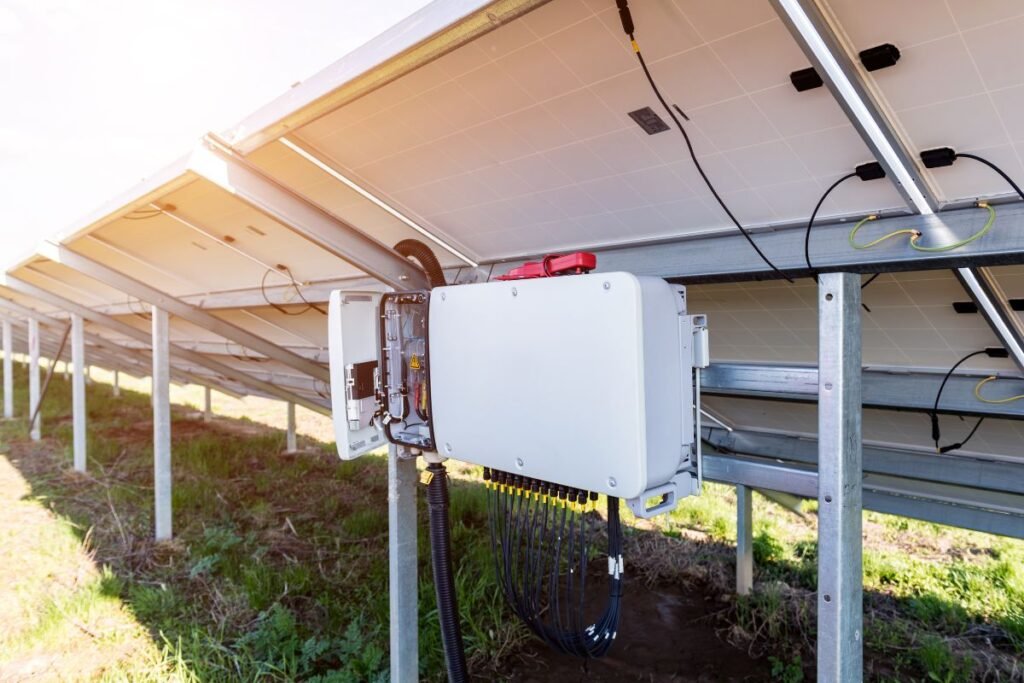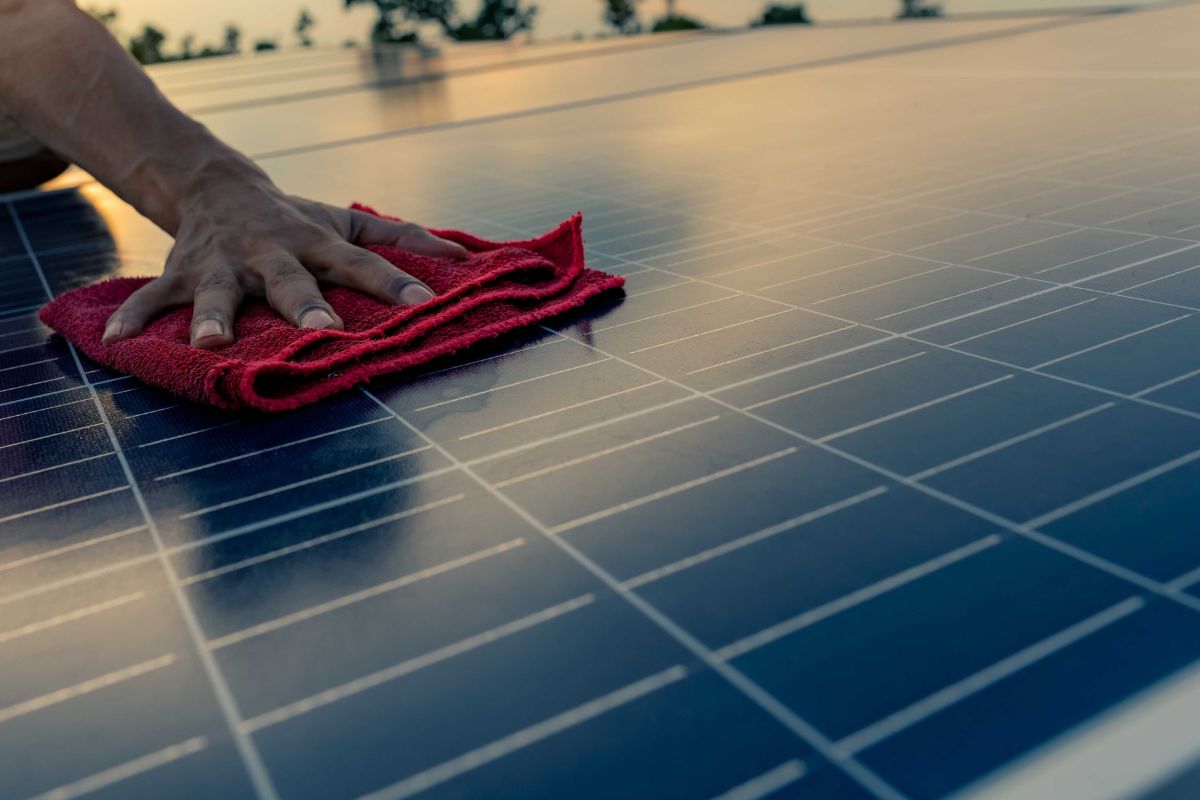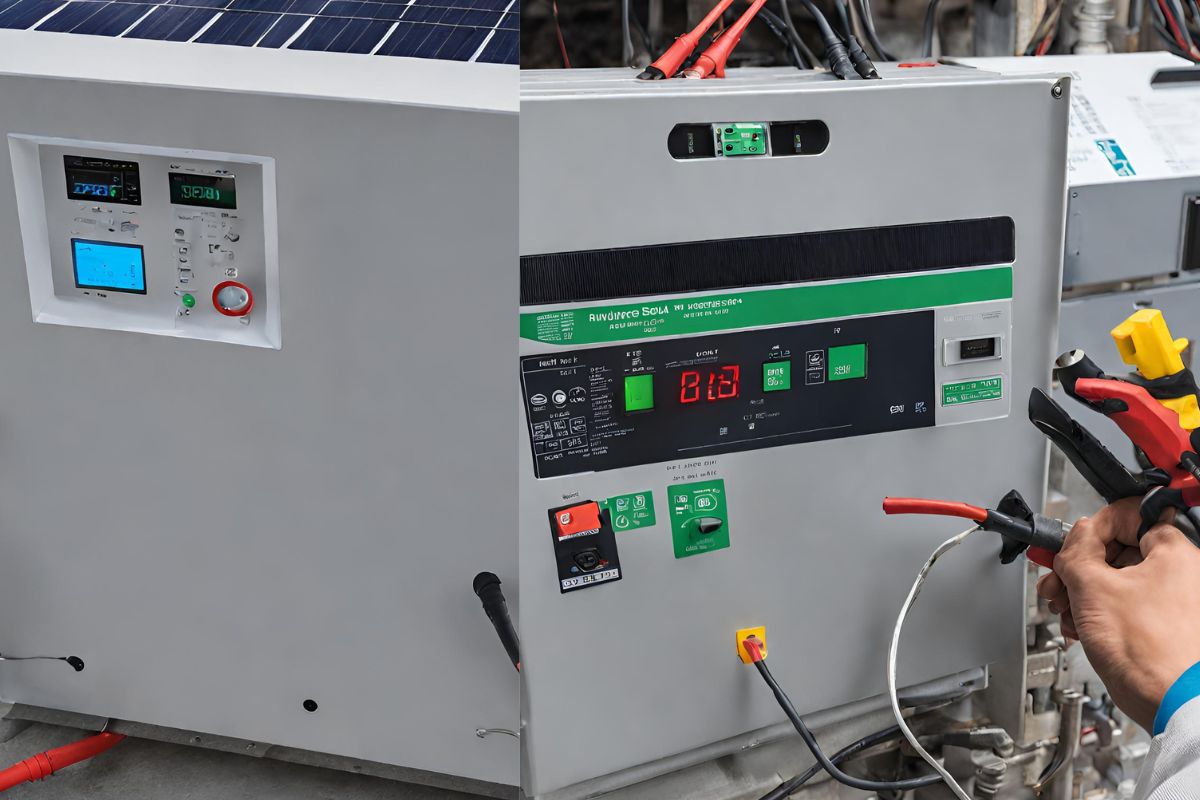Do you want to know about hybrid solar inverters? A hybrid solar inverter is a smart electronic device that combines a traditional solar inverter and a battery storage inverter, allowing direct current to be converted into alternating current.
The first reason I am so fascinated with the hybrid solar inverter is its two-in-one functionality, with many other fantastic features.
Imagine you have a solar power system on your roof that collects sunlight and turns it into electricity and still generates power even when the sun is gone.
Normally, this electricity can be used immediately in your home or sent back to the power grid if you’re producing more than you need.
Let’s get into more detail about the hybrid solar inverter in this article. But you can go through how to install hybrid solar inverter.
What Is A Hybrid Solar Inverter?
A hybrid solar inverter is like a special device doing two jobs. It takes power from your solar panels and a battery; it also knows how to manage all this electricity stuff smartly.
Also, Hybrid solar inverters are used in self-consumption photovoltaic installations to better use the energy produced by solar panels, batteries, the electrical grid, wind energy, and many other energy sources.
The main function of solar inverters is to transform direct current into alternating current while storing and discharging the energy obtained in the batteries.
Hybrid inverters are complete since they are designed to take advantage of energy from different sources simultaneously.
In this sense, these types of inverters are perfect for installing in those photovoltaic installations where the electrical network is of very low quality or does not directly sun reach.
It can handle the energy from the sun, the battery, and the regular electricity grid, ensuring everything works smoothly. It’s like having a super brain for your solar power system!
This is why this hybrid inverter is the clear future of self-consumption solar installations with batteries today.
Why Use A Hybrid Solar Inverter?
To begin with, I want to say the reason why I use a hybrid solar inverter. Is it multifunctional capacity when it comes to energy generation.
Hybrid solar inverters can work in several ways. Its main purpose is to function by transforming energy from direct current to alternating current.
Still, at the same time, they can do so while charging and discharging their solar batteries. Hybrid solar inverters can also work with a coupled electrical network.
They can use solar energy as the priority and, if necessary, switch out towards consumption or charge the solar batteries through the alternating current input.
With this mode of work, we will ensure that our solar batteries do not discharge from a limit.
Since we can program it so that as soon as they reach a certain voltage, the network enters to feed home consumption and charge the solar batteries.
We can also program the switch-out mode (Bypass) to inject from the distribution network through the inverter to the home only. We could send the excess energy to charge the solar accumulators.
Due to their great functionality, they are the future of this type of clean energy that will help the planet endure a sustainable electricity management system.
What Is The Difference Between A Solar Inverter And A Hybrid Inverter?
Inverters often play a role in renewable energy systems, such as solar power systems, to transform the direct current, or DC, electricity generated by solar panels into alternating current, or AC, that may power homes and buildings.
On the other hand, a hybrid inverter is designed to work with both renewable energy sources, such as solar power, and traditional energy sources, such as the public grid.
A hybrid inverter combines an inverter, a charge controller, and a grid tie function.
The main difference between a normal inverter and a hybrid one is that the hybrid inverter can work completely without a power grid.
This is ideal for people who live in rural areas where there is no access to a power grid, or for people who want backup in the event of blackouts or power outages.
Another difference between an inverter and a hybrid inverter is that a hybrid inverter can run on both renewable and traditional energy sources. In contrast, an inverter can only run on renewable energy sources.
Another important difference is that hybrid inverters tend to be more efficient in energy management and storage than normal inverters. This means they save more energy and lower electricity costs.
Hybrid inverters are ideal for homes or buildings that use both standard and renewable energy sources and want the option to store and have excess energy.
They can provide more flexibility and reliability than traditional inverters as they can automatically switch between different power sources to ensure a constant electricity supply.
What Is The Advantage Of A Hybrid Solar Inverter?
A hybrid inverter is an excellent way to save money on your energy bill.
Hybrid inverters generate energy using grid and battery power, which can result in considerable savings over regular inverters.
Let’s start with the advantages of the hybrid solar inverter:
- Resilience in the case of a power outage: Unlike traditional inverters, hybrid inverters may work with or without the grid.
- High efficiency: Hybrid inverters are more efficient because they decrease conversion loss.
- Lower installation costs: Instead of purchasing two separate inverters to employ storage batteries later, install a hybrid inverter directly.
- No waste: The hybrid inverter is ideal for avoiding squandering produced energy. It is utilized, stored, or sold over the public network.
- Ease of installation: Because the hybrid inverter mixes two inverters, it simplifies your solar installation.
- Virtually minimal maintenance: The hybrid inverter requires no extra maintenance. It is robust and simple to operate, lowering your installation’s maintenance expenses.
- Virtually minimal maintenance: The hybrid inverter requires no extra maintenance. It is robust and simple to operate, lowering your installation’s maintenance expenses.
- Installation management: With a hybrid inverter, you can see your home’s energy use as well as the output of your solar installation.
As you may have known, a hybrid solar inverter is far better than a regular inverter. When considering an inverter for your solar system, consider the benefits and downsides.
What Is The Life Of A Hybrid Solar Inverter?
The average lifespan of a hybrid solar inverter varies. A good-quality hybrid solar inverter can last 10 to 15 years or even more.
If a problem were to occur before, breakdowns can manifest themselves in several ways.
If the malfunction comes from an overvoltage, the installer will take care of the steps so that the insurance takes care of the replacement of the defective solar inverter.
A hybrid solar inverter’s lifespan differs based on a few factors. Such as the quality of the inverter, how well it’s maintained, and the conditions it’s used.
However, it’s important to note that the inverter might need repairs or replacement during its lifetime. Especially if there are any technological changes regular maintenance can help extend its lifespan.
Also, advancements in technology could lead to more durable and longer-lasting inverters.
So, while a hybrid solar inverter might not last as long as the solar panels themselves. Which can often last 25 years or more. It’s a crucial part of your solar power system that can provide efficient energy management for many years.
Characteristics Of Hybrid Inverters In Solar Energy
The hybrid inverter functions as an intelligent energy management system, integrating solar energy produced by solar panels into the home’s electrical network.
It can store up extra energy it makes in batteries in exceptional cases of solar energy deficit. This way, you have power stored when no sun shines.
And if there’s not enough solar energy, it can get electricity from the grid. This ensures that your home always has electricity without any sudden power cuts.
In simple terms, this hybrid inverter does three important things:
- It changes the type of energy.
- It can also use regular electricity when needed.
- They can store extra energy.
Beyond their functions, the inverters that can currently be installed are of 3 types:
Grid connection inverters: They are connected to the electrical grid and are used to manage the level of the consumption of the energy produced by the solar panels and the grid.
AC-Coupled Inverters: AC-coupled inverters’ role in systems combining solar power with battery backup.
AC-coupled systems are flexible, making adding batteries to existing solar setups easy.
The grid-connected inverter changes the solar DC electricity into the electricity we use in our homes. The battery-powered inverter keeps the battery connected and ensures it charges and discharges.
Hybrid or mixed solar inverters are a combination of the above and are characterized by obtaining electricity from different sources.
Hybrid inverters in solar energy are specially manufactured for high battery voltages.
The solar energy generated during the day is used for its consumption. With the excess of unused solar energy, the battery of the domestic storage system is charged.
Currently, on the market, we find hybrid inverters with storage systems from 48V to 500V. Depending on the characteristics of the hybrid inverter but, in general, these have the same characteristics :
- They allow an intelligent charging application and network peak reduction function
- They have time intervals to charge or discharge the batteries
- Color touch LCD, IP65 protection
- Support a maximum charge/discharge current of 48V-120A on the battery
- They have frequency droop control for up to 16 batteries in parallel
- They house a DC coupling and an AC coupling
- 10 ms mains operation to isolated operation
The hybrid inverter functions as an intelligent energy management system. Integrating solar energy produced by solar panels into the home’s electrical network and producing excess.
It works as a battery charger and saves extra energy. energy developing an efficient and effective energy management system.
Final Thought
A hybrid solar inverter is like a smart device that does two important jobs. First, it takes the electricity generated by your solar panels and makes it ready to use in your home.
Even the need of how does a solar hybrid inverter work comes to place here so you will have the full picture of the hybrid system mechanism.
Second, it’s like a manager for a special battery that stores extra electricity. Instead of returning all the extra power to the grid, this inverter sends it to the battery.
Furthermore, as you may know, hybrid solar inverters are quite flexible devices. In addition to combining the three essential functions of an isolated installation into a single device inverter, charger, and regulator. They also allow you to connect numerous devices in parallel in a very easy manner.
But what if you could save that extra electricity for when the sun isn’t shining, like at night or on cloudy days? That’s where a hybrid solar inverter comes in.



